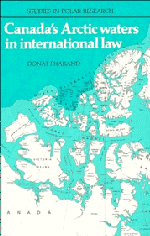Book contents
- Frontmatter
- Contents
- Figures
- Tables
- Foreword
- Preface
- Acknowledgements
- Part 1 The Waters of the Canadian Arctic Archipelago and the Sector Theory
- Part 2 The Waters of the Canadian Arctic Archipelago as Historic Waters
- 5 The basic characteristics of historic waters
- 6 Requirements of historic waters
- 7 State practice of Arctic states on historic waters
- 8 Historic waters applied to the Canadian Arctic Archipelago
- Notes
- Part 3 The Waters of the Canadian Arctic Archipelago and Straight Baselines
- Part 4 The Waters of the Canadian Arctic Archipelago and the Northwest Passage
- Notes
- General Conclusion
- Appendix A The 1825 Boundary Treaty, Great Britain and Russia
- Appendix B The 1867 Boundary Treaty, United States and Russia
- Selected bibliography
- Index
8 - Historic waters applied to the Canadian Arctic Archipelago
Published online by Cambridge University Press: 20 January 2010
- Frontmatter
- Contents
- Figures
- Tables
- Foreword
- Preface
- Acknowledgements
- Part 1 The Waters of the Canadian Arctic Archipelago and the Sector Theory
- Part 2 The Waters of the Canadian Arctic Archipelago as Historic Waters
- 5 The basic characteristics of historic waters
- 6 Requirements of historic waters
- 7 State practice of Arctic states on historic waters
- 8 Historic waters applied to the Canadian Arctic Archipelago
- Notes
- Part 3 The Waters of the Canadian Arctic Archipelago and Straight Baselines
- Part 4 The Waters of the Canadian Arctic Archipelago and the Northwest Passage
- Notes
- General Conclusion
- Appendix A The 1825 Boundary Treaty, Great Britain and Russia
- Appendix B The 1867 Boundary Treaty, United States and Russia
- Selected bibliography
- Index
Summary
The object of this chapter is twofold: first, to examine State activities of Great Britain and Canada in relation to the waters of the Canadian Arctic Archipelago and second, to appraise Canada's claim of historic waters in light of the legal requirements for the establishment of such a claim.
State activities of Great Britain before the transfer in 1880
The instructions to the official expeditions of the British explorers was to discover a passage between the Atlantic and Pacific Oceans. An examination of the journals and narratives of those expeditions also reveals that their takings of possession in what is now the Canadian Arctic Archipelago were confined to land. This conclusion simply confirms an earlier finding by Dr Gordon Smith in his historical study of those explorations that ‘they were concerned with land, not water; and it is conspicuous that whatever claims were made these claims were for the most part specifically to land’. Nevertheless, it becomes pertinent to review briefly the activities of Great Britain in the waters of the Archipelago, as Canada's predecessor in title, with a view to determining the extent of its presence in those waters before the transfer of the Arctic islands to Canada in 1880. If the review were to conclude that Great Britain's presence did not extend to much of the waters and that they were often frequented by foreign ships, it would become somewhat more difficult for Canada to meet the requirements of exclusive control for the necessary long period of time and the general acquiescence of foreign States.
- Type
- Chapter
- Information
- Canada's Arctic Waters in International Law , pp. 113 - 125Publisher: Cambridge University PressPrint publication year: 1988

